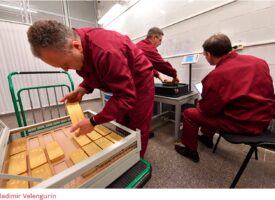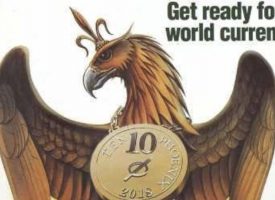With investors increasingly alarmed about China’s economy, will China gamble with an unprecedented stimulus package?
Investors Alarmed About China’s Economy
January 15 (King World News) – Gerald Celente: The yield on the bellwether 10-year Chinese government bond slumped to 1.6 percent as the new year began and has remained close to that level, signaling that investors have glum expectations for the country’s economic growth and a reversal in the deflation that has plagued the world’s second-largest economy, the Financial Times reported.
The bond market’s weakness piles additional pressure on Beijing to take forceful stimulus action to revive the domestic economy, analysts said to the FT. In 2024, officials repeatedly promised such actions but failed to deliver them.
The yield could decline further and end 2025 at 1.4 percent, especially if the government issues even more bonds to kick-start the economy, analysts at Standard Chartered wrote in a note.
On 9 January, the People’s Bank of China announced it would stop buying government bonds due to “a shortage of supply.” Up to that point, the bank had pocketed $23 billion worth of the bonds.
The yield’s downward trend indicates that “investors are alarmed about the long-term outlook and not just anticipating short-term cuts to interest rates,” the FT added…
ALERT:
To learn about one of the greatest gold & silver royalty companies in the world CLICK HERE OR ON THE IMAGE BELOW.
“Long-term yields have been trending down and that’s more about longer-term growth expectations becoming more pessimistic,” Hui Shan, Goldman Sachs’ chief China economist, confirmed to the FT. “That trend is likely to continue.”
On 9 January, China’s statistics agency released data showing consumer prices increased just 0.1 percent in December, year on year.
Factory prices slid another 2.3 percent during the month. China’s industrial sector has been in a deflationary cycle for more than two years.
In recent policy meetings, officials emphasized a new focus on the consumer economy, which has been crippled by a property crisis that has remained unresolved for more than three years.
Until now, Beijing has relied on public works and manufacturing for export to support the country’s GDP. Manufacturing is bumping into a wall of tariffs, which are poised to worsen, and public works are funded by government borrowing, which some officials already see as having reached “crisis” proportions.
If U.S. tariffs on Chinese imports rise 15 percentage points, China’s export revenue would drop 6 percent and the GDP would lose a full percentage point, Citi analysts have calculated.
China’s economy grew by an estimated 5 percent last year. The government has set the same target for 2025.
“More insidious than slower growth” are the deflationary pressures that have beset the country’s economy for seven consecutive quarters through December, with consumer and factory gate prices declining as demand shrinks.
“This is unprecedented for China, with a similar episode in 1998 and 1999,” Citi economists wrote in a note. Only Japan, some parts of Europe, and a few commodity markets have experienced the like, they noted.
Deflation pushes down interest rates, investment, and wages; consumers stop making major purchases as they wait for prices on appliances, cars, and other big-ticket items to fall further.
That scenario will persist in the absence of a clear, massive cash stimulus from the government, analysts are telling Beijing.
“It’s likely we’re going to get more stimulus, but with all the fits and starts of the past couple years, investors want to see concrete numbers,” Frederic Neumann, HSBC’s chief China economist, said to the FT.
TREND FORECAST:
China’s unresolved property crisis enshrouds the domestic economy. Chinese consumers will not resume spending until home values begin to rise, which is an unforeseeable trend in the near future. Also, three years of draconian zero-COVID policy has destroyed the lives and livelihoods of hundreds of millions.
China’s government has tried tepid measures, such as trimming interest rates and loosening restrictions on who can buy homes where. None have worked.
Increasingly, it looks like the only way to end the crisis is for the government to spend the estimated $1.4 trillion needed to buy the empty homes, a move that could throw the country into a new crisis, this one of public debt.
Prins Warns Gold Price May Double To $5,400
To listen to Nomi Prins discuss why the price of gold may double to $5,400+, what to expect from for the silver market, mining stocks, uranium market, currency markets, CLICK HERE OR ON THE IMAGE BELOW.
© 2025 by King World News®. All Rights Reserved. This material may not be published, broadcast, rewritten, or redistributed. However, linking directly to the articles is permitted and encouraged.








